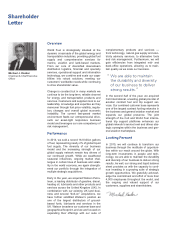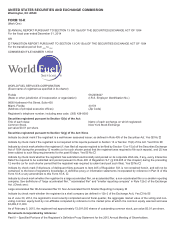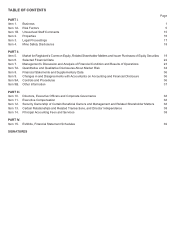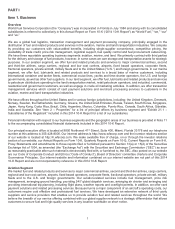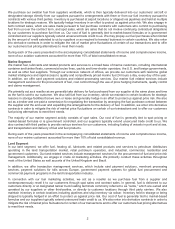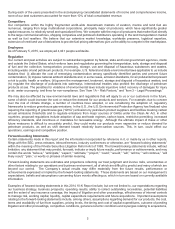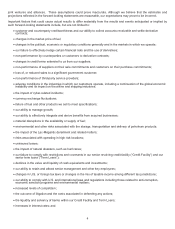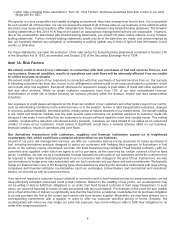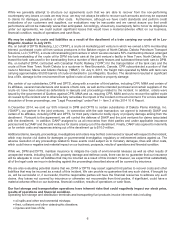World Fuel Services 2014 Annual Report Download - page 13
Download and view the complete annual report
Please find page 13 of the 2014 World Fuel Services annual report below. You can navigate through the pages in the report by either clicking on the pages listed below, or by using the keyword search tool below to find specific information within the annual report.8
Although we have taken steps to address these concerns by implementing network security and internal control measures,
there can be no assurance that a data security breach will not have a material adverse effect on our business, financial
condition, results of operations and cash flows.
Businesses we have acquired or may acquire in the future, as well as strategic investments such as joint venture
arrangements, expose us to increased operating risks.
As part of our growth strategy, we have been acquisitive and intend to continue to explore acquisition opportunities of fuel
resellers, logistics and transaction management and payment processing companies, as well as other service and
technology businesses. We cannot provide any assurance that we will find attractive acquisition candidates in the future,
that we will be able to acquire such candidates on economically acceptable terms or that we will be able to finance
acquisitions on economically acceptable terms. If we acquire new businesses in the future, we may incur substantial
additional indebtedness and other expenses or we may complete potentially dilutive issuances of equity securities, which
may affect the market price of our common stock, inhibit our ability to pay dividends or otherwise restrict our operations. We
have also entered into joint venture arrangements and equity method investments intended to complement or expand our
business, as well as divested of certain of our businesses. These types of transactions can pose substantial risks and
liabilities associated with their operations, as well as the risk that our relationships with our partners do not succeed in the
manner that we anticipate. These transactions involve significant challenges and risks, including:
• our ability to effectively integrate and manage acquired businesses or strategic investments, while maintaining uniform
standards and controls;
• our ability to realize our investment and anticipated synergies in the acquired businesses or strategic investments;
• the diversion of management’s time and attention from other business concerns, the potentially negative impact of
changes in management on existing business relationships and other disruptions of our business;
• the risks associated with entering into businesses or markets in which we may have no or limited direct prior
experience;
• the potential loss of key employees, customers or suppliers of the acquired businesses;
• the ability to integrate the IT systems of acquired businesses into our existing IT infrastructure and manage those
systems that cannot be effectively integrated;
• the requirement to write down acquired assets as a result of the acquired business being worth less than we paid for it;
• capital expenditure requirements exceeding our estimates;
• the risk that an acquisition or strategic investment could reduce our future earnings; and
• the assumption of material liabilities, exposure to litigation, regulatory noncompliance or unknown liabilities, and no or
limited indemnities.
Insurance coverage for some of our operations may be insufficient to cover losses, which may have a material
adverse effect on our financial condition and results of operations.
We maintain insurance to cover various risks associated with the operation of our business. Certain risks, however, such
as environmental risks, are not fully insurable and our insurance coverage does not cover all potential losses, costs, or
liabilities. Accordingly, our insurance policies may not adequately cover or may have exclusions of coverage for certain
losses. Therefore, there can be no assurance that our insurance coverage will be available or will be adequate to cover
claims that may arise.
Furthermore, our ability to obtain and maintain adequate insurance and the cost of such insurance may be affected by
significant claims, such as the Lac-Mégantic derailment, and conditions in the insurance market over which we have no
control. If the cost of insurance increases, we may decide to discontinue certain insurance coverage, reduce our level of
coverage or increase our deductibles/retentions in order to offset the cost increase. In addition, our existing types and levels
of insurance coverage could become difficult or impossible to obtain in the future. The occurrence of an event that is not
fully covered by insurance, the loss of insurance coverage or a significant increase in the cost of insurance could have a
material adverse effect on our business, financial condition, results of operations and cash flows.
Third parties who fail to provide products or services to us or our customers as agreed could harm our business.
We purchase fuel and other products from suppliers and resell to customers. If the fuel and other products we sell fail to
meet the specifications we have agreed to with customers, we could incur significant liabilities if a customer initiates a claim
or a lawsuit for which we settle or results in a decision against us. In addition, our relationship with our customers could be
adversely affected and adverse publicity about any allegations of contaminated products may negatively affect us,
regardless of whether the allegations are true. Although in most cases we have recourse against our suppliers for products
that fail to meet contractual specifications, such recourse cannot be assured and may be costly to enforce. For example,
several of our supply agreements are with foreign entities, including foreign governments, and are governed by the laws of
foreign jurisdictions. If a supplier breaches such agreement, then we may incur the additional costs of determining our rights


